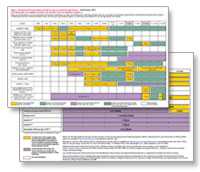Polio Vaccination Recommendations for Specific Groups
One of the Recommended Vaccines by Disease
Immunization Schedules
Routine poliovirus vaccination of U.S. adults (i.e., persons aged >18 years) is not necessary. Most adults do not need polio vaccine because they were already vaccinated as children and their risk of exposure to polioviruses in the United States is minimal.
However, some adults are at higher risk for exposure to poliovirus and should consider polio vaccination, including:
- Travelers to areas or countries where polio is epidemic or endemic (For additional information, see Polio: For Travelers);
- Members of communities or specific population groups with disease caused by wild polioviruses;
- Laboratory workers who handle specimens that might contain polioviruses;
- Health-care workers who have close contact with patients who might be excreting wild polioviruses;
- Unvaccinated adults whose children will be receiving oral poliovirus vaccine.
These higher-risk adults may need 1 to 3 doses of IPV, depending on how many doses they have had in the past.
Unvaccinated adults at risk for poliovirus infection should get three doses of IPV:
- two doses separated by 1 to 2 months, and
- a third dose 6 to 12 months after the second dose.
Higher-risk adults who have had one or two doses of polio vaccine in the past should get the remaining one or two doses. It doesn’t matter how long it has been since the earlier dose(s). Higher-risk adults who have had three or more doses of polio vaccine in the past may get a booster dose of IPV.
There are no known risks to getting IPV at the same time as other vaccines.
For more information, see the ACIP recommendations for polio vaccination.
- ACIP recommendations Updated August 2009
- Page last reviewed: January 27, 2017
- Page last updated: January 27, 2017
- Content source:


 ShareCompartir
ShareCompartir
